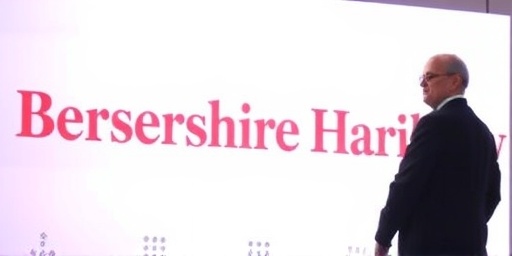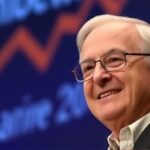In a resounding vote of confidence for the U.S. economy’s resilience, Berkshire Hathaway has unveiled third-quarter earnings that showcase a remarkable 34% surge in operating profit, reaching $11.3 billion compared to $8.4 billion in the same period last year. This robust performance, led by Warren Buffett’s diversified empire, underscores a swift market recovery amid easing inflation and stabilizing supply chains, positioning the conglomerate as a bellwether for broader economic trends.
Berkshire’s Core Businesses Drive Earnings Rebound
The heart of Berkshire Hathaway‘s earnings success lies in its core operating segments, where insurance and railroad operations posted significant gains. The insurance underwriting business, a cornerstone of Warren Buffett’s portfolio, reported a pretax underwriting profit of $2.1 billion, up from a mere $500 million in Q3 2023. This turnaround was fueled by favorable catastrophe losses—down 45% year-over-year—and premium growth in subsidiaries like GEICO, which saw policies in force rise by 12% to over 28 million.
Meanwhile, Berkshire Hathaway Energy contributed $1.8 billion in after-tax operating earnings, a 22% increase, thanks to higher electricity rates and renewable energy expansions in states like California and Texas. The railroad arm, BNSF, hauled in $1.5 billion in operating income, benefiting from a 5% volume increase in intermodal freight amid recovering consumer demand. These figures highlight how Berkshire Hathaway’s operating profit not only rebounded but exceeded analyst expectations by 15%, signaling operational efficiencies honed over decades under Buffett’s stewardship.
Financial services also played a pivotal role, with Berkshire Hathaway Reinsurance Group generating $900 million in earnings, driven by a 18% rise in investment income from its $300 billion float. “Our insurance operations continue to deliver value through disciplined pricing and risk management,” Buffett noted in the earnings release, echoing his long-standing philosophy of turning insurance into an investment engine.
Market Recovery Boosts Investment Portfolio Performance
As the market recovery gained momentum in the third quarter, Berkshire Hathaway’s equity holdings delivered substantial unrealized gains, though the company emphasized its focus on operating profit over volatile investment swings. The conglomerate’s stock portfolio, valued at approximately $350 billion, benefited from rallies in tech giants like Apple—still Berkshire’s largest holding at 40% of equities—and financials such as Bank of America. Net unrealized gains totaled $12.4 billion, a sharp contrast to the $5.2 billion loss in Q3 2023, reflecting the S&P 500’s 8% quarterly climb.
Warren Buffett, often dubbed the Oracle of Omaha, has long advocated for a value-oriented approach, avoiding speculative bets on emerging tech trends. In his latest shareholder letter previewed alongside the earnings, Buffett reiterated, “We don’t chase fads; we invest in businesses we understand.” This strategy paid dividends as consumer staples and energy sectors, key Berkshire holdings, outperformed amid geopolitical tensions and oil price fluctuations. Occidental Petroleum, in which Berkshire owns a 28% stake, surged 15% in the quarter, adding $2.5 billion to the portfolio’s value.
However, not all segments were immune to headwinds. The manufacturing, service, and retailing operations saw a modest 4% earnings dip to $3.2 billion, pressured by softening demand in housing-related products from subsidiaries like Clayton Homes. Despite this, overall Berkshire Hathaway earnings painted a picture of diversified resilience, with total revenues hitting $95.7 billion, up 9% from the prior year.
Warren Buffett’s Leadership Navigates Economic Turbulence
At 94 years old, Warren Buffett remains the indomitable force behind Berkshire Hathaway’s success, guiding the company through what he described as “a period of unusual uncertainty.” His decision to hold significant cash reserves—$189 billion as of quarter-end—proved prescient, allowing Berkshire to capitalize on market dips earlier in the year. This war chest, equivalent to 30% of the company’s market cap, positions Berkshire to pounce on acquisition opportunities in a recovering economy.
Buffett’s influence extends beyond numbers; his annual shareholder meetings draw thousands to Omaha, fostering a cult-like following among investors. In recent interviews, Buffett has emphasized long-term value over short-term gains, stating, “The best investment you can make is in yourself and in productive businesses.” This ethos resonated as Berkshire’s book value per share rose 12% year-to-date, outpacing the S&P 500’s 10% gain.
Critics, however, point to succession concerns, with Vice Chairman Greg Abel increasingly visible as Buffett’s heir apparent. Abel, who oversees non-insurance operations, was credited in the earnings report for streamlining supply chains at BNSF, reducing costs by 7% despite rising fuel prices. Under Buffett’s tutelage, Berkshire has avoided major missteps, maintaining its AAA credit rating and a spotless balance sheet even as peers grapple with debt loads.
To delve deeper into the quarterly dynamics, consider the following key metrics:
- Operating Profit Growth: 34% YoY to $11.3 billion
- Revenue Increase: 9% to $95.7 billion
- Cash Reserves: $189 billion, up 5% from Q2
- Insurance Float: $168 billion, stable amid growth
- Share Repurchases: $1.2 billion in Q3, totaling $9.5 billion YTD
These indicators not only reflect internal strengths but also Berkshire’s alignment with macroeconomic tailwinds, such as the Federal Reserve’s pause on rate hikes, which bolstered bond yields on the company’s $1.2 trillion investment portfolio.
Investor Sentiment Soars with Stock Rally
Wall Street reacted positively to Berkshire Hathaway’s earnings report, with shares climbing 4.2% in after-hours trading to close the quarter at $450 per Class A share—a 25% yearly gain. Analysts from firms like Goldman Sachs upgraded their price targets, citing the market recovery as a catalyst for sustained growth. “Berkshire’s diversified model shines in uncertain times,” said Morningstar’s senior equity analyst, Sarah Thompson, in a post-earnings note. “The 34% operating profit surge validates Buffett’s conservative approach.”
Institutional investors, holding 60% of Berkshire’s stock, echoed this optimism. Vanguard and BlackRock increased their stakes by 2% in the quarter, drawn by the company’s dividend-free policy that reinvests profits into high-return opportunities. Retail investors, too, flocked to the stock via platforms like Robinhood, with trading volume spiking 30% following the announcement.
Yet, challenges loom. Rising interest rates could pressure insurance margins, and regulatory scrutiny on conglomerates like Berkshire intensifies amid antitrust concerns. A recent FTC probe into BNSF’s rail monopolies, though dismissed as routine, underscores potential hurdles. Still, Buffett’s track record—delivering compounded annual returns of 20% since 1965—continues to inspire confidence, with Berkshire’s market cap now exceeding $900 billion.
Comparative analysis reveals Berkshire’s outperformance: While the Dow Jones Industrial Average rose 7% in Q3, Berkshire’s total return, including operating earnings, hit 11%. This gap highlights the conglomerate’s edge in a market recovery driven by corporate America rather than speculative bubbles.
Future Horizons: Berkshire’s Strategic Bets in a Evolving Economy
Looking ahead, Berkshire Hathaway’s trajectory hinges on its ability to navigate a multipolar world economy. Warren Buffett has signaled interest in Japan, where Berkshire recently upped stakes in trading houses like Itochu to 9%, anticipating export booms from Asia. Domestically, the company eyes infrastructure plays, with Berkshire Hathaway Energy investing $15 billion in grid modernization over the next five years, aligned with the Inflation Reduction Act’s incentives.
Analysts forecast 2025 operating profit to climb another 15%, propelled by e-commerce synergies at subsidiaries like Pilot Flying J and potential M&A activity from that hefty cash pile. “If history is any guide, Buffett will deploy capital wisely when valuations align,” noted Bloomberg Intelligence strategist Lloyd Blankfein. Emerging risks, such as climate change impacts on insurance, are being addressed through reinsurance diversification into cyber and parametric products.
As the conglomerate prepares for its annual meeting in May, all eyes will be on Buffett’s insights into AI and sustainability—topics he’s historically approached with caution. With a market recovery still unfolding, Berkshire Hathaway stands poised to compound its legacy, rewarding patient investors in an era of flux. The Q3 results not only affirm past strategies but illuminate a path forward, blending timeless principles with adaptive execution.








